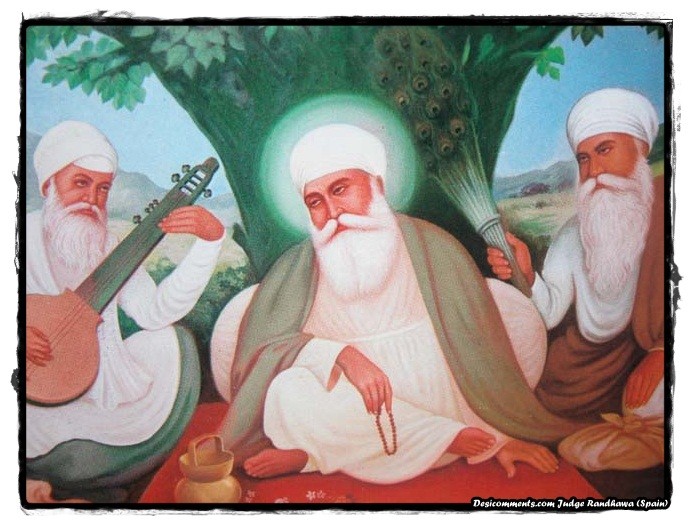“Guru Nanak’s message can be briefly summarized as a doctrine of salvation through disciplined meditation on the divine name. The divine name signifies the total manifestation of God, a single Being, immanent both in the created world and within the human spirit. Salvation is understood in terms of escape from the transmigratory round of death and rebirth to a mystical union with God. Meditation must be strictly inward, and all external aids such as idols, temples, mosques, scriptures, and set prayers are explicitly rejected.” – Encyclopedia Britannica.
Guru Nanak primarily brought people from different faiths together and taught common sense goodness, serving humanity and caring for the neighbors. Indeed, the religion we call Sikhism started as an interfaith movement.
Throughout his life, Guru Nanak emphasized that no person can be “above” any other person; all are a part of creation and are equally close to God. Indeed, no one is more privileged than the other. Given the misogynistic society 500 years ago, his teachings were ahead of his time to treat women as equals, and gender discrimination in the Sikh community has no religious basis.
Gurpurab is the 554th birth celebration of the first Sikh guru, Guru Nanak. It is one of the most sacred festivals of the Sikhs and Sikhism. Five hundred fifty-four years ago, God sent Guru Nanak to restore peace and harmony in society. The conflicts and tensions in India at that time needed a peacemaker, and he brought the Hindu and Muslim communities together through devotional hymns composed by Hindu and Muslim saints. The Quran says God sends a peacemaker to every society. He loves his creation and wants it to live cohesively with peace and harmony. Shri Krishna said whenever a society deteriorates and people live in fear of each other, he would emerge among them to restore righteousness. Similarly, Jesus, Buddha, Moses, Zoroaster, and other great souls have appeared to restore harmony among their people. Every one of them was an auto-corrector for society.
Guru Nanak fulfilled what God wanted him to do to build cohesive societies where individuals feel secure about their uniqueness, be it the filters of faith, race, ethnicity, language, or culture.
Guru Nanak’s birthday has a special significance to me. He primarily brought people from different faiths together and taught common sense goodness, serving humanity and caring for the neighbors. Indeed, the religion we call Sikhism started as an interfaith movement. One message that resonates with me is his guidance to “accept all humans as your equals and let them be your only sect (one humanity).” Throughout his life, Guru Nanak emphasized that no person can be “above” any other person; all are a part of creation and are equally close to God. Indeed, no one is more privileged than the other. Given the misogynistic society 500 years ago, his teachings were ahead of his time to treat women as equals, and gender discrimination in the Sikh community has no religious basis. He laid the foundation for a community to serve humankind, and the Sikh community has repeatedly demonstrated to the world that they care for fellow humans wholeheartedly.
Sikhs, along with the Red Cross and other institutions, are among the first communities to rescue whenever a disaster strikes worldwide. When the Wisconsin shooting in a Gurdwara killed several people, the Sikhs in America showed the world how to deal with the conflict. They held prayer vigils throughout America instead of blaming or cursing the criminals. The Center for Pluralism recognized this model of conflict mitigation in their annual Unity Day and presented the recognition trophies to all five Sikh Gurdwaras in Dallas, Texas.
The Langars (the food kitchens) he established serve millions of hungry people worldwide. Service to humanity is the number one form of worship. When you serve God’s creation, you are serving God.
When the Government of India removed article 370 without the people’s consent, a few radical ministers in India rejoiced that Kashmir was open now and that they could take the Kashmiri women as they pleased. Thanks to the Sikh community for holding a press conference and challenging that no one “no mai ka lal” would harm any woman anywhere in India and that they would protect the women. It brought tremendous relief to women knowing that the Sikh community would stand by them.
“Guru Nanak’s message can be briefly summarized as a doctrine of salvation through disciplined meditation on the divine name. The divine name signifies the total manifestation of God, a single Being, immanent both in the created world and within the human spirit. Salvation is understood in terms of escape from the transmigratory round of death and rebirth to a mystical union with God. Meditation must be strictly inward, and all external aids such as idols, temples, mosques, scriptures, and set prayers are explicitly rejected.” Britannica. Let’s pray that the spirit of Guru Nanak reemerges in each of us to restore peace and harmony in the world.
May the Noor (divine light) of Guru Nanak brighten the world.
Happy Gurpurab!
(Mike Ghouse is the CEO and founder of the Center for Pluralism and an interfaith wedding Officiant. He offers pluralistic solutions on issues of the day to the media, policymakers, and others. More about him at www.TheGhouseDiary.com)
